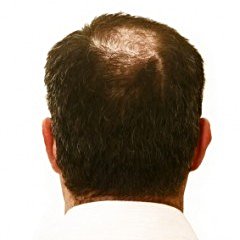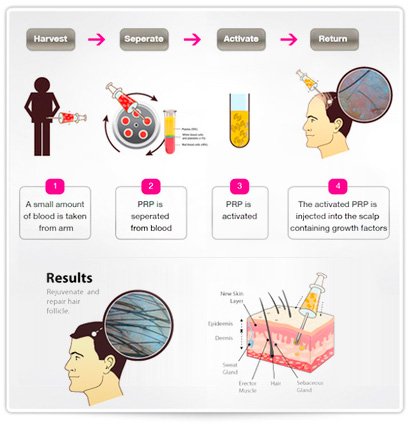In the last 4 years The International Hair Research Foundation carried out a scientific evaluation of the effectiveness and safeness of the PRP (Platelet-Rich Plasma) technique. Their study was performed on 568 men (56%) aged from 18 to 72. 465 women (44%) aged from 16 to 78. International Hair Research Foundation Study found a significant increase in the number of hairs after the treatment was obtained in 80% of cases (both in male and female subjects). In 93% of cases a therapeutic effect was obtained and a significant improvement of hair miniaturization, hair loss, itching or trichodynia (discomfort or pain in the scalp or hair) – if present – was observed. Please visit the International Hair Research Foundation for more information on this study.
Platelet Rich Plasma
PRP Platelet Rich Plasma Treatments are injections to the patients scalp and are used to stimulate the growth of hair follicles, thereby halting or reversing miniaturization (thinning hair) seen in androgenic alopecia (common baldness) cases.
Human Blood Flow & PRP Integration
Human blood is comprised primarily of red blood cells (RBC), as well as white blood cells (WBC), platelets, and plasma. By initiating the first step of coagulation, platelets are the key to the body’s ability to heal wounds. It is thought that by increasing the platelet count in a wounded area, the body’s healing to that area would be accelerated – explaining the use of PRP in wound healing. Its possible effects on promoting hair growth make it potentially useful as both used in addition to hair transplantation surgery and for the medical treatment of hair loss. Platelet Rich Plasma (PRP) is a concentrated blood plasma which contains approximately three to five times the number of platelets found in normal circulating blood. In addition to the platelets, it contains growth factors and other bioactive proteins that aid in wound healing and hair growth.
Growth Factors
The human growth hormone (hGH), insulin-like growth factor-1 (IGF-1), insulin-like growth factor binding protein-3 (IGFBP-3), basic fibroblast growth factor (bFGF or FGF-2), vascular endothelial growth factor (VEGF), and platelet-derived growth factor-BB (PDGF-BB)- levels are significantly elevated after PRP injection, supporting a possible ergogenic effect of PRP.
How it Works
The Paragon Plastic Surgery & Med Spa uses a double centrifuge technique that allows the active biologic factors to be administered at the most effective concentration. The treatments are administered by one of our Nurses and take about a half hour. If Dr. Mark A. Bishara, M.D. P.A. decides that you are in fact a good candidate, we may be able to perform the PRP procedure at the time of the consult. If the procedure cannot be performed at the time of consultation, you can schedule one very soon after. In either case, the consult fee will be deducted from your first treatment.
Candidates
Platelet rich plasma offers an additional way to stimulate hair growth, especially in people who cannot use other forms of treatment. For example, it may be useful for someone that is not a candidate for a hair transplant, or cannot use finasteride. It is also useful in the treatment of crown thinning where a hair transplant may not be appropriate. It works best where there is existing thinning hair not a completely bald area. We are only using Platelet Rich Plasma to treat hair loss on the scalp at this time.
Downtime
The treatment is done during a simple office visit and takes about 30-45 minutes. The patient is able to go back to regular routine after the treatment. One may have some very temporary soreness and swelling, but many patients experience no side affects after the treatment.
Results
Usually patients see results in 3 to 6 months. However, the response time may be variable. Research also agrees that about 70%-90% of patients will see a degree of improvement of hair mass/density. The latest data indicates 3 PRP therapy treatments has the greatest effectiveness for hair growth stimulation and many patients get PRP once every other year following the initial 3 treatments.





